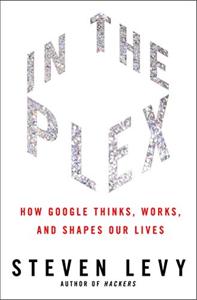
Want to learn the ideas in In the Plex better than ever? Read the world’s #1 book summary of In the Plex by Steven Levy here.
Read a brief 1-Page Summary or watch video summaries curated by our expert team. Note: this book guide is not affiliated with or endorsed by the publisher or author, and we always encourage you to purchase and read the full book.
Video Summaries of In the Plex
We’ve scoured the Internet for the very best videos on In the Plex, from high-quality videos summaries to interviews or commentary by Steven Levy.
1-Page Summary of In the Plex
Beginnings
Larry Page and Sergey Brin founded Google. They didn’t think big at first, but they did believe in thinking globally. Larry Page was a visionary who had the courage to attempt the impossible. His co-workers joked that he went to the future and came back to tell them about it.
Brin and Page met when Brin was a tour guide. Both were computer science majors at Stanford University in California. They saw the potential for people to be connected, which led them to create Google. Page created an algorithm that ranked websites based on how many other sites linked to it (PageRank). He realized that its power lay not in ranking annotations but in ranking searches and developed Google as a way of searching anything online.
Page and Brin used PageRank for their doctoral theses, but they wanted to make money off of it as well. They offered the PageRank search engine to Yahoo, who didn’t see its commercial potential. After that, they met with various companies about selling it, but all said no. Finally, Google was incorporated in September 1998 with $100K from an investor.
Google was started in a dorm room by two students who were trying to get rid of all their computer problems. They created Google and it became popular very quickly, with 10,000 queries per day. The founders had no money for servers, so they bought any that they could find as well as some off the shelf drives. Their search engine took 3.5 seconds to load, which is unacceptable in today’s world where speed is everything. Because of this problem, Larry Page and Sergey Brin wanted top engineers on their team from the beginning. They hired only graduates from Stanford University, which made them look like a serious company.
Let It Break
By 1999, Google had more than 3,000 computers. The founders of Google chose the right hardware for their needs because they knew that they would need a lot of machines in order to grow and keep up with demand. They bought cheap equipment instead of high-end machines so that if one broke down, it wouldn’t be as expensive to replace it. Because they were buying so many machines at once and anticipating failure rates among them all, their software was designed specifically around redundancy—the ability to shift storage space or processing power from one machine to another instantly if there’s a problem with the first one. This way, even though the company wasn’t spending money on top-of-the-line products initially, it could afford redundancy later on when its business grew larger.
Page was inspired by Tesla, but he didn’t make a lot of money from his discoveries. Page vowed not to repeat that mistake. He knew how important it was for Google to be profitable and so launched AdWords in 2000, which made the company profitable from the start. AdWords became one of Google’s most successful products and is now the dominant advertising platform on the Internet
Translation
Page and Brin saw language as a mere technical problem. They wanted Google to be able to translate any page into almost any language. As early as 2001, users could read Google in 26 languages. In order for this to happen, Google built the largest language models “in the history of mankind” (Franz Och). When its engineers saw that processors began to understand a language after about a billion words, in true Google style, they fed the system multiple billions of sentences (1 trillion). The more sentences it absorbed, the more it understood. In addition, Google used an ingenious counterintuitive solution to establish speech recognition: It launched a free US telephone directory service and never monetized it; instead it just wanted millions of callers to “teach” its computers how spoken English works so that later on when people spoke into their phones or other devices with microphones attached—the computer would recognize what was being said. After several years had passed and enough samples were gathered from these calls—Google quietly discontinued the service without telling anyone why but simply stated that now all you need is your phone or other device with microphone attached!





